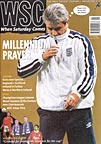 Two top-ten teams in their group and trips to war-torn countries and earthquake-affected Turkey made the Republic of Ireland's qualifying campaign tricky, but Piers Edwards tells us how they came so close to success
Two top-ten teams in their group and trips to war-torn countries and earthquake-affected Turkey made the Republic of Ireland's qualifying campaign tricky, but Piers Edwards tells us how they came so close to success
“For us it is a football match, for them it is a matter of life and death.” Ireland’s manager Mick McCarthy was actually talking about the earthquake in Turkey, but he may as well have been discussing the football. For the Irish, it was another unbelievable episode in a campaign full of them. For Turkey, the earthquake meant the nation desperately craved the opportunity for celebration that the play-off promised.
Ireland’s qualifying campaign was littered with obstacles. They had been forced to negotiate war in the Balkans, the Nato bombing of Yugoslavia and half their qualifiers being rescheduled, not to mention opponents ranked third and eighth in the world. Then Turkey was rocked by an earthquake which measured 7.2 on the Richter scale the day before the first game.
The build-up to the first leg was akin to the rubbish spoken before a world heavyweight title fight. Turkish officials, led by manager Mustafa Denizli, were well aware of the potential for whipping up their team’s fans for the second leg and, while playing straight to the Irish media, they told theirs a different story.
They complained about their training facilities (having completely ignored the FAI’s sound advice), insinuated that McCarthy was lying about his injury problems (he wasn’t) and claimed that the team had slept little before the match thanks to some 50-100 Irish fans singing (news to the hotel staff). The British press did not help by falsely asserting that 3,000 people had taken to the streets of Bursa, the venue for the second leg, to voice their anger.
For the return leg, the Turks neglected Istanbul, Ankara and Izmir as venues in favour of little-known Bursa, where they have beaten both Germany and Holland in the past year. This augured badly for a Republic side which had won away only in Malta, Liechtenstein, Iceland and Lithuania under McCarthy.
The ground was full three hours before kick-off. Not with Irish though. So successful was their chief tour operator’s scaremongering that less than 100 supporters had travelled to Turkey. The smallest support in years for possibly their biggest night had its roots in the alleged malevolent nature of the locals and the prospect of more earthquakes. The atmosphere proved so partisan that local officials thought nothing of handing out Turkish flags in the press box.
The crowd would have counted for little if Ireland had scored but, in another pedestrian display, they created few chances. Denizli had no need to utilise the three men he claimed he needed to mark Niall Quinn. Turkey proved their own worst enemies as they contrived to miss a multitude of chances, even though stand-in Irish keeper Dean Kiely performed heroics. With minutes left the charged cry of “Turkiye, Turkiye” filled a formerly apprehensive ground, as it became apparent that the goalless draw was going to take them through.
The “Welcome to Hell” hadn’t materialised at the airport (McCarthy was handed flowers), but the send- off got a bit closer. Certain Irish players, Cascarino in particular, were the recipients of punches after the final whistle.
In the opposite corner, Denizli was chaired around the stadium and occasionally stopped to acknowledge the crowd, each time kissing the Turkish flag. If the end sparked pandemonium on the pitch, the streets outside were no better. Perhaps the Irish were right. Bursa wasn’t safe. The roads around the stadium witnessed a cavalcade of cars, horns blaring, people and flags hanging out of the windows.
Irish fans looking to drown their sorrows found the town had already been painted red. A weary Irish squad embarked on the eight hours of travelling by bus, boat and plane to get them home. What must have demoralised them further was the thought that all this could have been avoided, if they just could have managed to hold out in Macedonia. For 12 seconds.
From WSC 155 January 2000. What was happening this month